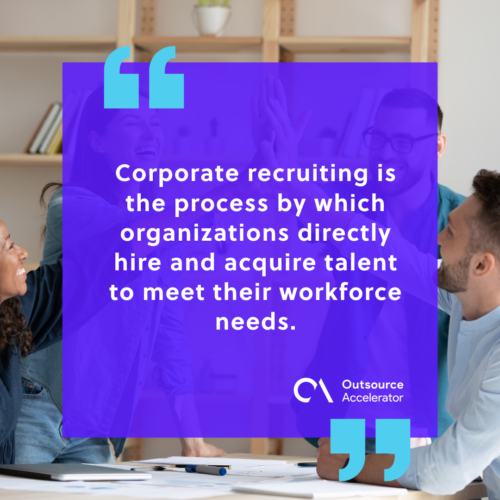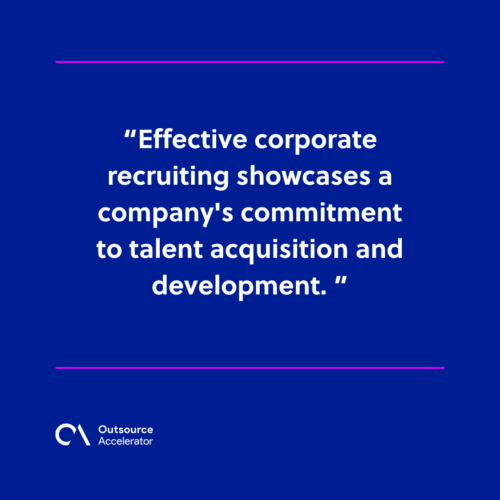Elevate talent acquisition with corporate recruiting

Talent acquisition has emerged as a critical determinant of an organization’s success. Gone are the days of sifting through piles of resumes and settling for subpar candidates.
Corporate recruiting allows you to take control of your hiring process. It also ensures that a business attracts top talent who is perfect for the company.
Data from ThriveMyWay highlights the importance of this hiring approach. It found that the biggest challenge 76% of recruiters face is attracting qualified candidates.
To elevate talent acquisition with corporate recruiting, companies can benefit from the specialized skills and expertise of a corporate recruiter.
This guide explores the unique advantages of corporate recruiting and distinguishes it from other methods. We will also provide expert tips to help you revolutionize your hiring game.
What is corporate recruiting?
Corporate recruiting is the process by which organizations directly hire and acquire talent to meet their workforce needs.
It involves seeking out applicants who:
- Align with the company’s values and culture
- Fit the job requirements
- Possess the necessary skills and qualifications
Corporate recruiters are responsible for managing the recruiting process from start to finish. Part of their job includes:
- Sourcing candidates
- Screening resumes
- Conducting interviews
- Extending job offers
Corporate recruiters play a crucial role in maintaining the company’s employer brand and fostering a positive candidate experience throughout the hiring process.

Corporate recruiting vs. Staffing
When comparing corporate recruiting to staffing, hiring managers play a crucial role in ensuring the success of the hiring process.
Corporate recruiting differs from staffing because it involves hiring employees for permanent positions. On the other hand, staffing focuses more on filling short-term or temporary positions.
Both staffing and corporate recruitment strategies aim to address workforce needs. However, the latter places an emphasis on long-term talent acquisition and retention.
Corporate recruiting vs. Agency recruiting
Another distinction to make is between corporate recruiting and agency recruiting.
Third-party recruitment agencies are intermediaries between applicants and hiring companies. They source candidates, screen them, and present a shortlist to the company.
In contrast, corporate recruiters work directly for a company and handle its entire recruitment process in-house. They have a deeper understanding of the company’s culture, values, and specific job requirements.
Benefits of corporate recruiting
Corporate recruiting offers several advantages over other talent acquisition methods. Let’s explore some of this hiring process benefits:
Greater alignment with company culture
Corporate recruiters have an intimate understanding of the company’s culture. This means they can ensure that candidates are a good fit in terms of values, work ethic, and team dynamics.
This leads to higher employee satisfaction and stronger cohesion within the organization.
Targeted candidate searches
Corporate recruiting allows firms to proactively seek out job applicants with the specific skill sets and qualifications required for the job.
This targeted approach increases the likelihood of finding the right candidates quickly. As a result, it reduces the time-to-fill positions and costly turnover.
Cost efficiency
By investing in an internal corporate recruiting team, companies can save on the fees associated with agency recruiters or staffing firms.
Having a dedicated team also allows for streamlined processes and reduced administrative costs.
Better control and privacy
When recruiting in-house, organizations have more control over the recruitment process. This can involve boosting data security and confidentiality.
This is especially important when handling sensitive information or hiring for executive positions.
Enhanced employer branding
Effective corporate recruiting showcases a company’s commitment to talent acquisition and development. This leads to a positive employer brand.
As a result, it helps attract top talent who actively seek out organizations known for their talent management practices.

Signs your company should do corporate recruiting
If you’re unsure whether your company should invest in corporate recruiting, here are some signs that suggest it might be time to make the transition:
Consistent hiring needs
Corporate recruiting can be a valuable solution if your company frequently has open positions and struggles to find the right candidates.
By building internal recruiting teams, you can proactively address staffing needs and reduce dependency on external sources.
An effective employee referral program can serve as a clear indicator that your company should invest in corporate recruiting.
High turnover rates
If your firm experiences a high turnover rate, it may indicate a misalignment between candidates and the company’s culture or values.
Corporate recruitment allows for a more targeted approach to finding employees who can thrive in your organization’s environment.
Cultural emphasis
Corporate recruiting becomes essential when your enterprise places a strong emphasis on culture fit and values alignment.
OnHires also revealed that 77% of applicants assess a company’s culture before applying for a position.
In-house recruiters intimately understand your firm’s unique culture. They ensure applicants possess the required skills and seamlessly integrate into the organization’s values and work environment.
This results in a workforce that excels professionally and aligns with the company’s ethos.
Strategic workforce planning
Corporate recruitment is invaluable if your business has a long-term strategy that demands specific talent to achieve its goals.
It enables you to build a talent pipeline proactively. This gives you access to a pool of qualified candidates ready to step into crucial roles when needed.
This strategic workforce planning ensures that your company remains agile and well-prepared for future talent requirements.
Recruitment costs escalating
As external recruitment costs continue to rise, it can become a financial burden for your organization. Transitioning to an in-house corporate recruiting model can provide cost-efficiency in the long run.
By managing the recruitment process internally, you have better control over expenses. Over time, this approach can result in significant cost savings, especially for companies with ongoing hiring needs.
Developing a corporate recruiting strategy
To create an effective corporate recruiting strategy, consider the following steps:
Identify talent requirements
Determine the key skills, qualifications, and competencies required for each position. This will guide your search for suitable candidates.
It is essential to conduct a comprehensive analysis of potential job candidates to pinpoint the most suitable individuals who share your company’s values and objectives.
Create an employer value proposition (EVP)
Develop an EVP highlighting your firm’s unique selling points as an employer. This will help attract top talent by showcasing what sets your organization apart from competitors.
Optimize your employer brand
Enhance your employer brand through effective employer branding initiatives. This includes promoting your company’s values, culture, and positive employee experiences through various channels.
Leverage multiple sourcing channels
Use a mix of channels to source potential candidates. These can include job boards, employee referrals, social media platforms, and professional networks.
Multiple sourcing channels diversify your talent pool and increase the chances of finding those who are the best fit.
Implement an efficient screening process
Develop a systematic screening process to assess candidates’ qualifications, skills, and cultural fit. This can include resume reviews, phone screenings, and competency-based interviews.
Streamline the interview process
Aim for an efficient interview process that respects applicants’ time while thoroughly evaluating their potential suitability. Standardize interview questions and involve key stakeholders to ensure comprehensive assessments.
Offer competitive compensation and benefits
Develop competitive salaries and compensation packages that follow industry standards.
Consider offering attractive benefits, professional development opportunities, and work-life balance initiatives to attract and retain top talent.

Measure and optimize results
Continuously track and analyze recruitment metrics, such as time-to-fill, cost per hire, and candidate satisfaction. Use this data to refine and optimize your recruiting strategies for better outcomes.
Building a corporate recruiting team
Building a strong corporate recruiting team is essential for effective talent acquisition. Consider the following steps and suggestions:
Identify key roles
Determine the specific roles and responsibilities needed within the recruiting teams. It can include roles like recruiters, coordinators, and sourcing specialists.
A well-structured team can effectively collaborate with the hiring manager to understand their specific needs, leading to successful recruitment efforts.
Define competencies
Outline the necessary competencies and skills required for each role in the team. This can include qualities like effective communication, relationship-building, candidate assessment, and data analysis.
Recruit top talent
Utilize your own recruiting strategies to attract and hire top talent for your corporate recruiting team.
Look for individuals with relevant experience, a passion for talent acquisition, and a strong understanding of your company’s culture and values.
Provide training and development
Invest in the ongoing training and development of your recruitment team members.
This can include workshops, conferences, and access to industry resources to enhance their skills and keep them updated on best practices.
Encourage collaboration and communication
Foster a collaborative environment where your corporate recruitment team can share insights, collaborate on projects, and learn from each other’s experiences.
Encourage open communication to ensure effective teamwork and problem-solving.
Promote continuous improvement
Regularly review and refine your corporate recruiting processes based on feedback and data-driven insights. Encourage your team to provide suggestions for improvement and implement changes based on their recommendations.
Tips to improve your corporate recruiting strategy
To improve your corporate recruiting strategy continuously, keep the following tips in mind:
Stay informed
Stay updated on modern best practices and trends in talent acquisition.
Attend industry conferences, participate in webinars, and engage with professional networks to gain insights into the latest recruiting strategies and technologies.
Leverage technology
Utilize recruiting software and tools to streamline your processes, enhance candidate tracking, and automate repetitive tasks. This frees up time for recruiters to focus on more strategic and relationship-building activities.
Engage with passive candidates
Interact with passive candidates who are not actively searching for job openings.
This involves building relationships, understanding their career aspirations, and keeping them informed about potential opportunities within your organization.
Cultivate employee referral programs
Incentivize and motivate your employees to refer suitable candidates. Employee referrals can be a valuable source of high-quality applicants who are likely to thrive within your company’s culture.
Measure success metrics
Continuously measure and analyze recruitment metrics to assess the effectiveness of your corporate recruiting strategy.
Tracking relevant metrics can help you identify areas for improvement and make data-driven decisions.
In the fast-paced corporate world, using metrics can offer insights into areas needing improvement and aid in making data-driven decisions to optimize recruitment.







 Independent
Independent




